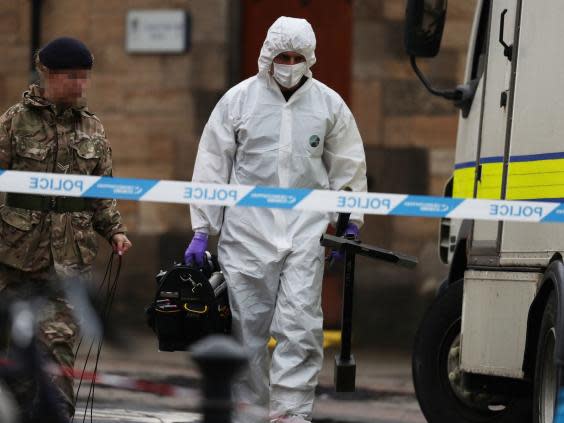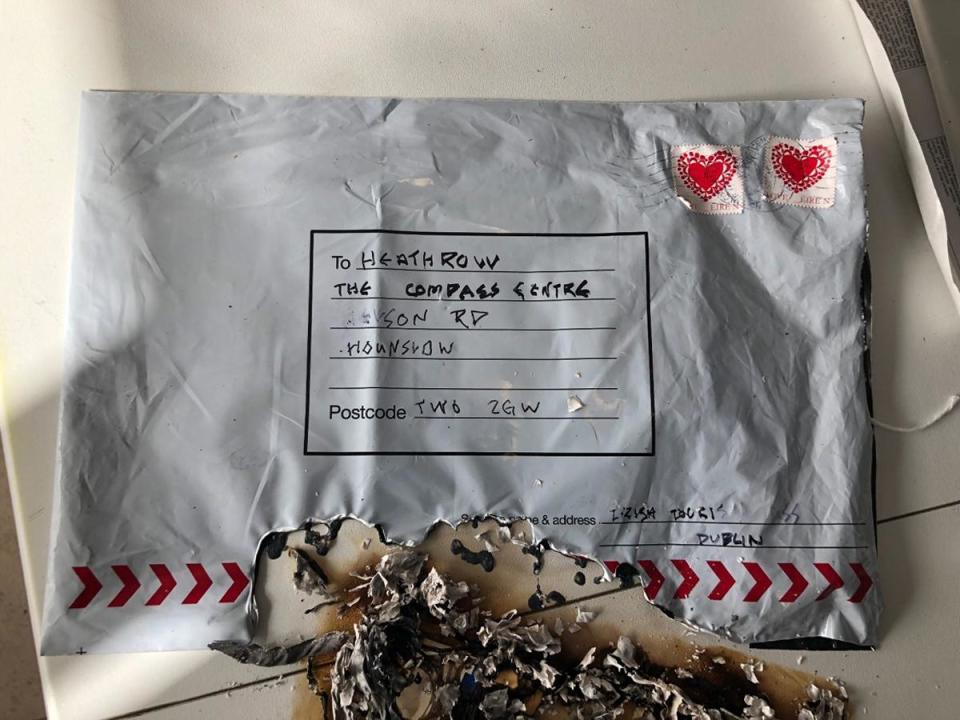‘Fifth IRA parcel bomb’ discovered at Limerick sorting office after failing to reach UK target
A letter bomb discovered at a sorting office in Ireland is believed to be part of a campaign that saw similar devices sent to targets in the UK.
Bomb disposal experts were called to the An Post depot in Limerick after staff raised the alert on Friday morning.
Investigators said the package appeared to be “identical” to four bombs received earlier this month at Heathrow, London City Airport, Waterloo railway station and the University of Glasgow.
Ireland’s justice minister said the package could be the last of five devices that a group calling itself the IRA claimed they sent out earlier this month.
Charlie Flanagan said a distinctive limited edition stamp on the suspicious item was the same as that used in the bombs that sparked security alerts in London and Glasgow.
“This is a despicable act,” he told RTE. “The sending of incendiary devices like this is totally unacceptable. I hope the people responsible are brought to justice.”
When asked whether the suspicious package could be the fifth bomb the “IRA” claimed to have sent out, he replied: “We have reason to believe this could be the case.”
A claim of responsibility said three parcel bombs were sent to “commercial targets” while the remaining two were directed to British army recruitment officers.
But only four had been discovered, at Heathrow, London City Airport, Waterloo railway station and the University of Glasgow, and police warned the public to be vigilant for other devices.
Investigators in Ireland believe the package discovered in Limerick failed to reach its intended destination in the UK and was returned to the National Return Letter Centre – the depot for all undeliverable mail in Ireland.
A Garda spokesperson said: “An Garda Síochána are currently investigating a parcel of interest identified at the Limerick An Post sorting office shortly after 6am this morning.
“This parcel appears to be identical to parcels (pending closer forensic and ballistic examination) discovered earlier this month in London and Glasgow. The Army explosive ordnance disposal team are currently at the scene.
“An Garda Síochána continue to liaise with the UK authorities in relation to these investigations.”
London’s Metropolitan Police confirmed the IRA had made a claim of responsibility last week and said the investigation continues.
Officers said extensive advice has been issued to armed forces personnel, businesses and the transport sector to be vigilant for potential suspicious devices.
“Given the packages bore similarities to devices sent in the past which were linked to dissident groups associated with Northern Ireland-related terrorism, officers were already looking at this as a line of enquiry. However, we continue to keep an open mind and enquiries continue,” a spokesperson for Scotland Yard added.
The discovery of four devices on 5 and 6 March sparked a wave of evacuations and security alerts, but only one device partially detonated and no one was seriously injured.
Police said the packages were all A4-sized white postal bags and contained “small improvised explosive devices” that were capable of igniting an initially small fire when opened.

They had been posted from the Republic of Ireland, with false senders’ addresses in Dublin written on the outside.
The identical packages were addressed by hand, with stamps from a limited 2018 Valentine’s Day range produced by Ireland’s An Post service, featuring the words “Love Eire”.
The IRA fought a paramilitary campaign against British rule in Northern Ireland and has launched deadly bombing campaigns on the British mainland that culminated during the Troubles.
It previously targeted British army recruitment centres in February 2014, when devices were sent to seven offices across the southeast of England.
The most recent incarnation of the republican terrorist group, the “New IRA”, was also suspected of being behind a car bombing that struck Derry in January.
Police Service of Northern Ireland’s assistant chief constable Mark Hamilton described the faction as “small, largely unrepresentative and determined to drag people back to somewhere they don’t want to be”.

 Yahoo News
Yahoo News 
